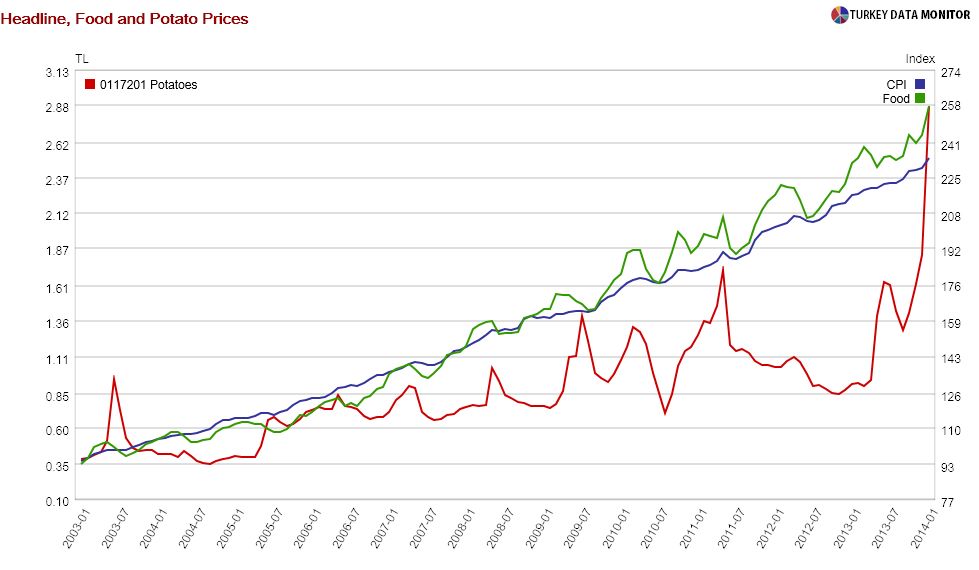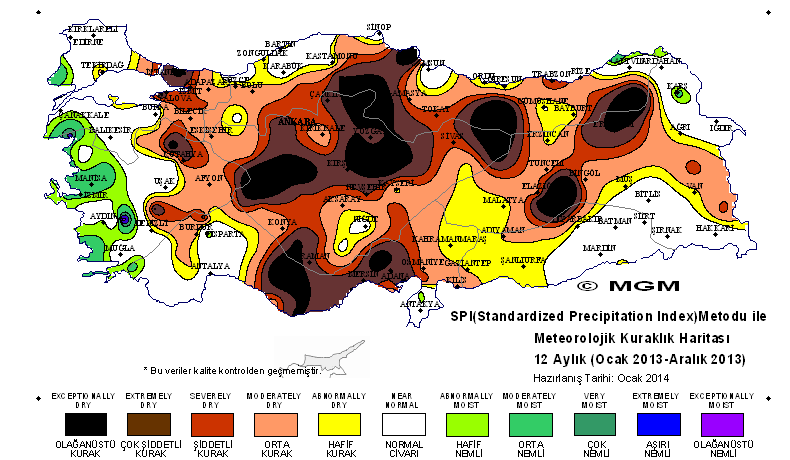I got an email from a loyal reader, who fervently believes that Turkish inflation statistics are cooked, shortly after the January figures were released on Feb. 3.
Here is the intro. to my latest Hurriyet Daily News (HDN) column. I often get emails from readers, usually after an inflation data release:), who claim that their observed inflation is much higher than the official figures. So when The Turkish Statistical Institute (TurkStat) revised the headline figures upwards after admitting they had misentered tobacco prices, I thought the time had had come for me to address the issue once and for all- especially when the Betam note (unfortunately, only in Turkish) on inflation for different income groups I referred to in the column came out.
I have a few additional points to make, but before that, a couple of sentences on the “misentering”: It was quite interesting in the sense that while the monthly and annual inflation numbers for tobacco were wrong, its average price was actually right. In fact, that’s how my friends at Turkey Data Monitor noticed something was wrong and decided to call TurkStat to check up.
Moving on, one particular food item is quite interesting. Average potato prices surged from 1.8 to 2.9 liras in January. Potato prices have more than tripled in the last 9 months. As a Reuters article noted, this could spell trouble for the ruling Justice and Development Party (AKP), as potato is a staple food item. 
And it is not only rising prices. Turkish food inflation is extremely volatile. So why are potato prices in particular, and food prices in general are increasing so rapidly? Why is food inflation so volatile? According to Agriculture Minister Mehdi Eker, the recent rise in bean, potato and meat prices is the work of a “lobby” (link in Turkish). Hmmm… I knew of the interest rate lobby, but I am hearing this “agriculture lobby” for the first time.
A more particular explanation is weather, as explained in a recent note by the Oxford Business Group. The state’s Meteorology Directorate’s drought map, compliments of economist Aykut Kibritcioglu, shows the gravity of the situation: 
The methodology, standardized precipitation index, seems like a commonly-used way to measure drought, but if you can read Turkish, they have an explanatory note. In any case, if drought is the main problem, the solution is simple: PM Recep Tayyip Erdogan and his ministers could hold regular “prayin-for-rain” sessions (link in Turkish)
But I think more than weather is at stake here. As mentioned in the Reuters article, structural factors such as middlemen, small-scale production, input costs) are very relevant as well. But that is all for a future column.
Moving on, TurkStat also released their annual revision to the CPI weights. One of the most interesting changes was the inclusion of trips to Mecca as a separate item. I actually noticed that when Bloomberg’s Izzy Finkel got in touch with me for quick comments, and she ended up writing a neat little piece. As I also told her, Mecca trip has always had a zero weight in my consumption basket, although items related to my football team Besiktas (jerseys, season passes, etc) could make up more than food!:) As I explained in the column, everyone has a different inflation:)…
Original post
- English (UK)
- English (India)
- English (Canada)
- English (Australia)
- English (South Africa)
- English (Philippines)
- English (Nigeria)
- Deutsch
- Español (España)
- Español (México)
- Français
- Italiano
- Nederlands
- Português (Portugal)
- Polski
- Português (Brasil)
- Русский
- Türkçe
- العربية
- Ελληνικά
- Svenska
- Suomi
- עברית
- 日本語
- 한국어
- 简体中文
- 繁體中文
- Bahasa Indonesia
- Bahasa Melayu
- ไทย
- Tiếng Việt
- हिंदी
Turkish Inflation A Blow To PM Erdogan
Published 02/10/2014, 01:47 AM
Updated 07/09/2023, 06:31 AM
Turkish Inflation A Blow To PM Erdogan
Latest comments
Loading next article…
Install Our App
Risk Disclosure: Trading in financial instruments and/or cryptocurrencies involves high risks including the risk of losing some, or all, of your investment amount, and may not be suitable for all investors. Prices of cryptocurrencies are extremely volatile and may be affected by external factors such as financial, regulatory or political events. Trading on margin increases the financial risks.
Before deciding to trade in financial instrument or cryptocurrencies you should be fully informed of the risks and costs associated with trading the financial markets, carefully consider your investment objectives, level of experience, and risk appetite, and seek professional advice where needed.
Fusion Media would like to remind you that the data contained in this website is not necessarily real-time nor accurate. The data and prices on the website are not necessarily provided by any market or exchange, but may be provided by market makers, and so prices may not be accurate and may differ from the actual price at any given market, meaning prices are indicative and not appropriate for trading purposes. Fusion Media and any provider of the data contained in this website will not accept liability for any loss or damage as a result of your trading, or your reliance on the information contained within this website.
It is prohibited to use, store, reproduce, display, modify, transmit or distribute the data contained in this website without the explicit prior written permission of Fusion Media and/or the data provider. All intellectual property rights are reserved by the providers and/or the exchange providing the data contained in this website.
Fusion Media may be compensated by the advertisers that appear on the website, based on your interaction with the advertisements or advertisers.
Before deciding to trade in financial instrument or cryptocurrencies you should be fully informed of the risks and costs associated with trading the financial markets, carefully consider your investment objectives, level of experience, and risk appetite, and seek professional advice where needed.
Fusion Media would like to remind you that the data contained in this website is not necessarily real-time nor accurate. The data and prices on the website are not necessarily provided by any market or exchange, but may be provided by market makers, and so prices may not be accurate and may differ from the actual price at any given market, meaning prices are indicative and not appropriate for trading purposes. Fusion Media and any provider of the data contained in this website will not accept liability for any loss or damage as a result of your trading, or your reliance on the information contained within this website.
It is prohibited to use, store, reproduce, display, modify, transmit or distribute the data contained in this website without the explicit prior written permission of Fusion Media and/or the data provider. All intellectual property rights are reserved by the providers and/or the exchange providing the data contained in this website.
Fusion Media may be compensated by the advertisers that appear on the website, based on your interaction with the advertisements or advertisers.
© 2007-2025 - Fusion Media Limited. All Rights Reserved.
